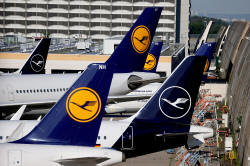|
The
group reported adjusted earnings before interest and tax (EBIT)
of 17 million euros ($20 million) in the third quarter, versus a
loss of 1.262 billion euros a year earlier, supported by strong
freight business and rising demand during the summer season with
the easing of travel restrictions.
"We have mastered another milestone on our way out of the
crisis: We are back to black," Chief Executive Officer Carsten
Spohr said.
Analysts in a company-provided poll had expected an adjusted
EBIT loss of 33 million euros.
Lufthansa's air cargo business reported a record adjusted EBIT
of 301 million euros, as demand and air freight rates rose due
to ocean freight bottlenecks and global supply chains
disruptions.
"The favourable supply-demand gap will last at least until 2022,
but with a high degree of probability beyond that," Spohr said.
The company's third-quarter revenue almost doubled to 5.2
billion euros, compared with analysts' forecast for 5.5 billion.
Lufthansa, which also owns Eurowings, Swiss, Brussels and
Austrian Airlines, said it expected demand to develop
positively, resulting in positive earnings before interest, tax,
depreciation and amortisation (EBITDA) in the fourth quarter.
It said third-quarter capacity, measured in available seat-kilometres,
was 50% of the pre-crisis level. It expects 2022 capacity to
rise to more than 70% of the 2019 level.
"The positive development will continue up to 80% in the second
half of the year," Spohr added.
New bookings are currently at 80% of 2019 levels, the airline
said, prompted by recovering business bookings and rising demand
for long-haul flights, especially to the United States,
Lufthansa's most important and profitable market.
With the U.S. opening for travellers from Europe next week,
Spohr said transatlantic bookings were already around 80% of
pre-crisis levels, adding he expected mainland China to open up
in the middle of 2022 rather than early next year.
Shares in Lufthansa were up 6.1% at 1101 GMT, the second best
performer on Germany's mid-cap MDAX index.
The group, which last year received a 9 billion euro lifeline in
public funding to stay afloat, said it expected capital
expenditure of around 2 billion euros next year and that it was
aiming for 2.5 billion a year in the long term.
($1 = 0.8634 euros)
(Reporting by Ilona Wissenbach and Riham Alkousaa; Editing by
Sherry Jacob-Phillips and Mark Potter)
[© 2021 Thomson Reuters. All rights
reserved.] Copyright 2021 Reuters. All rights reserved. This material may not be published,
broadcast, rewritten or redistributed.
Thompson Reuters is solely responsible for this content.

|
|





